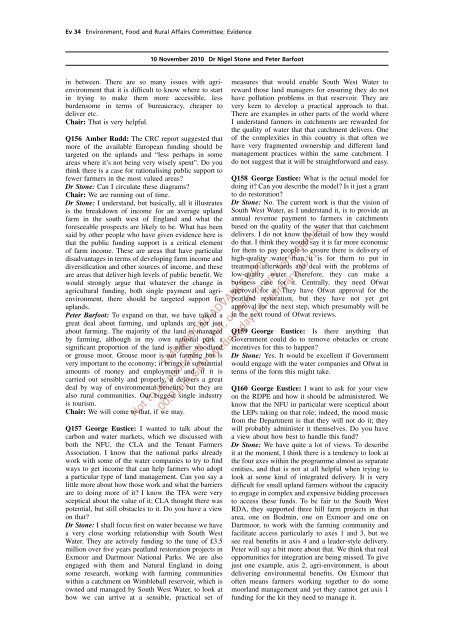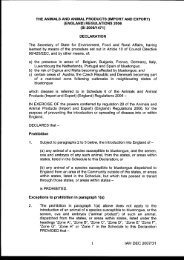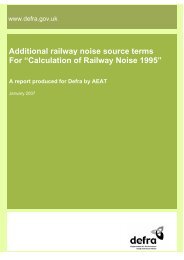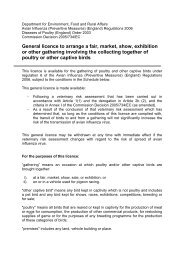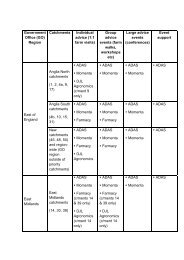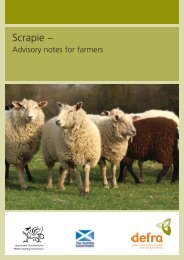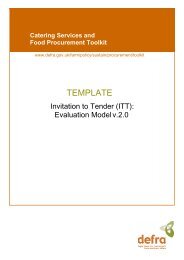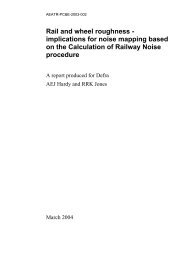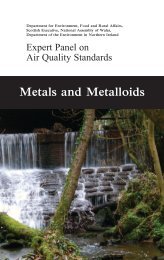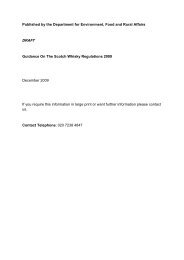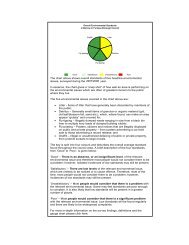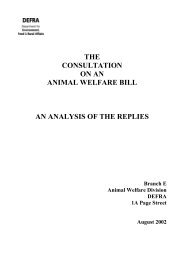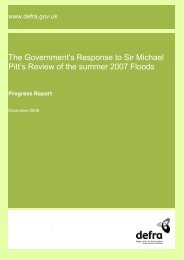Farming in the Uplands - ARCHIVE: Defra
Farming in the Uplands - ARCHIVE: Defra
Farming in the Uplands - ARCHIVE: Defra
Create successful ePaper yourself
Turn your PDF publications into a flip-book with our unique Google optimized e-Paper software.
Ev 34 Environment, Food and Rural Affairs Committee: Evidence<br />
<strong>in</strong> between. There are so many issues with agrienvironment<br />
that it is difficult to know where to start<br />
<strong>in</strong> try<strong>in</strong>g to make <strong>the</strong>m more accessible, less<br />
burdensome <strong>in</strong> terms of bureaucracy, cheaper to<br />
deliver etc.<br />
Chair: That is very helpful.<br />
Q156 Amber Rudd: The CRC report suggested that<br />
more of <strong>the</strong> available European fund<strong>in</strong>g should be<br />
targeted on <strong>the</strong> uplands and “less perhaps <strong>in</strong> some<br />
areas where it’s not be<strong>in</strong>g very wisely spent”. Do you<br />
th<strong>in</strong>k <strong>the</strong>re is a case for rationalis<strong>in</strong>g public support to<br />
fewer farmers <strong>in</strong> <strong>the</strong> most valued areas?<br />
Dr Stone: Can I circulate <strong>the</strong>se diagrams?<br />
Chair: We are runn<strong>in</strong>g out of time.<br />
Dr Stone: I understand, but basically, all it illustrates<br />
is <strong>the</strong> breakdown of <strong>in</strong>come for an average upland<br />
farm <strong>in</strong> <strong>the</strong> south west of England and what <strong>the</strong><br />
foreseeable prospects are likely to be. What has been<br />
said by o<strong>the</strong>r people who have given evidence here is<br />
that <strong>the</strong> public fund<strong>in</strong>g support is a critical element<br />
of farm <strong>in</strong>come. These are areas that have particular<br />
disadvantages <strong>in</strong> terms of develop<strong>in</strong>g farm <strong>in</strong>come and<br />
diversification and o<strong>the</strong>r sources of <strong>in</strong>come, and <strong>the</strong>se<br />
are areas that deliver high levels of public benefit. We<br />
would strongly argue that whatever <strong>the</strong> change <strong>in</strong><br />
agricultural fund<strong>in</strong>g, both s<strong>in</strong>gle payment and agrienvironment,<br />
<strong>the</strong>re should be targeted support for<br />
uplands.<br />
Peter Barfoot: To expand on that, we have talked a<br />
great deal about farm<strong>in</strong>g, and uplands are not just<br />
about farm<strong>in</strong>g. The majority of <strong>the</strong> land is managed<br />
by farm<strong>in</strong>g, although <strong>in</strong> my own national park a<br />
significant proportion of <strong>the</strong> land is ei<strong>the</strong>r woodland<br />
or grouse moor. Grouse moor is not farm<strong>in</strong>g but is<br />
very important to <strong>the</strong> economy; it br<strong>in</strong>gs <strong>in</strong> substantial<br />
amounts of money and employment and, if it is<br />
carried out sensibly and properly, it delivers a great<br />
deal by way of environmental benefits, but <strong>the</strong>y are<br />
also rural communities. Our biggest s<strong>in</strong>gle <strong>in</strong>dustry<br />
is tourism.<br />
Chair: We will come to that, if we may.<br />
Q157 George Eustice: I wanted to talk about <strong>the</strong><br />
carbon and water markets, which we discussed with<br />
both <strong>the</strong> NFU, <strong>the</strong> CLA and <strong>the</strong> Tenant Farmers<br />
Association. I know that <strong>the</strong> national parks already<br />
work with some of <strong>the</strong> water companies to try to f<strong>in</strong>d<br />
ways to get <strong>in</strong>come that can help farmers who adopt<br />
a particular type of land management. Can you say a<br />
little more about how those work and what <strong>the</strong> barriers<br />
are to do<strong>in</strong>g more of it? I know <strong>the</strong> TFA were very<br />
sceptical about <strong>the</strong> value of it; CLA thought <strong>the</strong>re was<br />
potential, but still obstacles to it. Do you have a view<br />
on that?<br />
Dr Stone: I shall focus first on water because we have<br />
a very close work<strong>in</strong>g relationship with South West<br />
Water. They are actively fund<strong>in</strong>g to <strong>the</strong> tune of £3.5<br />
million over five years peatland restoration projects <strong>in</strong><br />
Exmoor and Dartmoor National Parks. We are also<br />
engaged with <strong>the</strong>m and Natural England <strong>in</strong> do<strong>in</strong>g<br />
some research, work<strong>in</strong>g with farm<strong>in</strong>g communities<br />
with<strong>in</strong> a catchment on Wimbleball reservoir, which is<br />
owned and managed by South West Water, to look at<br />
how we can arrive at a sensible, practical set of<br />
10 November 2010 Dr Nigel Stone and Peter Barfoot<br />
measures that would enable South West Water to<br />
reward those land managers for ensur<strong>in</strong>g <strong>the</strong>y do not<br />
have pollution problems <strong>in</strong> that reservoir. They are<br />
very keen to develop a practical approach to that.<br />
There are examples <strong>in</strong> o<strong>the</strong>r parts of <strong>the</strong> world where<br />
I understand farmers <strong>in</strong> catchments are rewarded for<br />
<strong>the</strong> quality of water that that catchment delivers. One<br />
of <strong>the</strong> complexities <strong>in</strong> this country is that often we<br />
have very fragmented ownership and different land<br />
management practices with<strong>in</strong> <strong>the</strong> same catchment. I<br />
do not suggest that it will be straightforward and easy.<br />
Q158 George Eustice: What is <strong>the</strong> actual model for<br />
do<strong>in</strong>g it? Can you describe <strong>the</strong> model? Is it just a grant<br />
to do restoration?<br />
Dr Stone: No. The current work is that <strong>the</strong> vision of<br />
South West Water, as I understand it, is to provide an<br />
annual revenue payment to farmers <strong>in</strong> catchments<br />
based on <strong>the</strong> quality of <strong>the</strong> water that that catchment<br />
delivers. I do not know <strong>the</strong> detail of how <strong>the</strong>y would<br />
do that. I th<strong>in</strong>k <strong>the</strong>y would say it is far more economic<br />
for <strong>the</strong>m to pay people to ensure <strong>the</strong>re is delivery of<br />
high-quality water than it is for <strong>the</strong>m to put <strong>in</strong><br />
treatment afterwards and deal with <strong>the</strong> problems of<br />
low-quality water. Therefore, <strong>the</strong>y can make a<br />
bus<strong>in</strong>ess case for it. Centrally, <strong>the</strong>y need Ofwat<br />
approval for it. They have Ofwat approval for <strong>the</strong><br />
peatland restoration, but <strong>the</strong>y have not yet got<br />
approval for <strong>the</strong> next step, which presumably will be<br />
<strong>in</strong> <strong>the</strong> next round of Ofwat reviews.<br />
Q159 George Eustice: Is <strong>the</strong>re anyth<strong>in</strong>g that<br />
Government could do to remove obstacles or create<br />
<strong>in</strong>centives for this to happen?<br />
Dr Stone: Yes. It would be excellent if Government<br />
would engage with <strong>the</strong> water companies and Ofwat <strong>in</strong><br />
terms of <strong>the</strong> form this might take.<br />
Q160 George Eustice: I want to ask for your view<br />
on <strong>the</strong> RDPE and how it should be adm<strong>in</strong>istered. We<br />
know that <strong>the</strong> NFU <strong>in</strong> particular were sceptical about<br />
<strong>the</strong> LEPs tak<strong>in</strong>g on that role; <strong>in</strong>deed, <strong>the</strong> mood music<br />
from <strong>the</strong> Department is that <strong>the</strong>y will not do it; <strong>the</strong>y<br />
will probably adm<strong>in</strong>ister it <strong>the</strong>mselves. Do you have<br />
a view about how best to handle this fund?<br />
Dr Stone: We have quite a lot of views. To describe<br />
it at <strong>the</strong> moment, I th<strong>in</strong>k <strong>the</strong>re is a tendency to look at<br />
<strong>the</strong> four axes with<strong>in</strong> <strong>the</strong> programme almost as separate<br />
entities, and that is not at all helpful when try<strong>in</strong>g to<br />
look at some k<strong>in</strong>d of <strong>in</strong>tegrated delivery. It is very<br />
difficult for small upland farmers without <strong>the</strong> capacity<br />
to engage <strong>in</strong> complex and expensive bidd<strong>in</strong>g processes<br />
to access <strong>the</strong>se funds. To be fair to <strong>the</strong> South West<br />
RDA, <strong>the</strong>y supported three hill farm projects <strong>in</strong> that<br />
area, one on Bodm<strong>in</strong>, one on Exmoor and one on<br />
Dartmoor, to work with <strong>the</strong> farm<strong>in</strong>g community and<br />
facilitate access particularly to axes 1 and 3, but we<br />
see real benefits <strong>in</strong> axis 4 and a leader-style delivery.<br />
Peter will say a bit more about that. We th<strong>in</strong>k that real<br />
opportunities for <strong>in</strong>tegration are be<strong>in</strong>g missed. To give<br />
just one example, axis 2, agri-environment, is about<br />
deliver<strong>in</strong>g environmental benefits. On Exmoor that<br />
often means farmers work<strong>in</strong>g toge<strong>the</strong>r to do some<br />
moorland management and yet <strong>the</strong>y cannot get axis 1<br />
fund<strong>in</strong>g for <strong>the</strong> kit <strong>the</strong>y need to manage it.<br />
EMBARGOED ADVANCE COPY:<br />
Not to be published <strong>in</strong> full, or part, <strong>in</strong> any form before<br />
00.01am GMT Wednesday 16 February 2011


